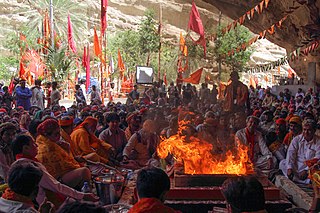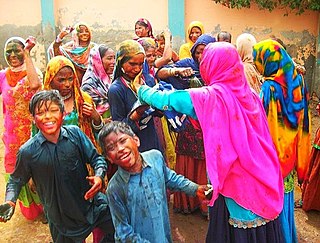
Freedom of religion in Pakistan is formally guaranteed by the Constitution of Pakistan for individuals of various religions and religious sects.
Hindus have experienced both historical and ongoing religious persecution and systematic violence, in the form of forced conversions, documented massacres, genocides, demolition and desecration of temples, as well as the destruction of educational centres.

Hinduism is the fourth-largest religion in Malaysia. About 1.97 million Malaysian residents are Hindus, according to 2020 Census of Malaysia. This is up from 1.78 million in 2010.
Pakistan has five major ethno-regional communities in Pakistan: Baloch, Muhajir, Punjabis, Pushtuns and Sindhis, as well as several smaller groups. There are also religious and sectarian groups such as Ahmadis, Christians, Hindus, Kalasha, Parsis and Sikhs, and Shia Muslim sects including Ismailis and Bohras.

Hinduism is the fourth-largest religion in Myanmar, being practised by 1.7% of the population of Myanmar. Hinduism is practised by about 890,000 people in Myanmar, and has been influenced by elements of Buddhism, with many Hindu temples in Myanmar housing statues of the Buddha. There is a sizable population of Hindus with the Myanmar Tamils and minority Bengali Hindus having the biggest population share.

Hinduism is the second largest religion in Bangladesh, as according to the 2022 Census of Bangladesh, approximately 13.1 million people responded that they were Hindus, constituting 7.95% out of the total population of 165.15 million people. In terms of population, Bangladesh is the third-largest Hindu populated country of the world, after the neighboring countries of India and Nepal. Hinduism is the second-largest religion in 61 out of 64 districts of Bangladesh, but there is no Hindu majority district in Bangladesh.

Hinduism is the second largest religious affiliation in Pakistan after Islam. Though Hinduism was one of the dominant faiths in the region a few centuries ago, its adherents accounted for just 2.17% of Pakistan's population according to the 2023 Pakistani census. With the largest population concentration in eastern Sindh province, Umerkot district has the highest percentage of Hindu residents in the country at 54.6%, while Tharparkar district has the most Hindus in absolute numbers at 811,507. Hindus are also found in southern Punjab and in areas of Balochistan and Khyber Pakhtunkhwa.

Hinduism is the largest and most practised religion in India. About 80% of the country's population identified as Hindu in the last census. India contains 94% of the global Hindu population. The vast majority of Indian Hindus belong to Shaivite, Vaishnavite and Shakta denominations. India is one of the three countries in the world where Hinduism is the dominant religion.
Chuhra, also known as Bhanghi and Balmiki, is a Dalit caste in India and Pakistan. Populated regions include the Punjab region of India and Pakistan, as well as Uttar Pradesh in India, among other parts of the Indian subcontinent such as southern India. Their traditional occupation is sweeping, a "polluting" occupation that caused them to be considered untouchables in the caste system.

Religion in Nepal encompasses a wide diversity of groups and beliefs. Nepal is a secular nation and secularism in Nepal under the Interim constitution is defined as "Religious and cultural freedom along with the protection of religion and culture handed down from time immemorial." That is, "The state government is bound for protecting and fostering Hindu religion while maintaining "Religious" and "Cultural" freedom throughout the nation as fundamental rights.

Anti-Hindu sentiment, sometimes also referred to as Hinduphobia, is a negative perception, sentiment or actions against the practitioners or religion of Hinduism. It exists in many contexts in many countries, often due to historical conflict. There is also scholarly debate on what constitutes Hinduphobia in the Western World.

The situation of human rights in Pakistan is complex as a result of the country's diversity, large population, its status as a developing country and a sovereign Islamic democracy with a mixture of both Islamic and secular law.
Punjabi Hindus are adherents of Hinduism who identify ethnically, linguistically, culturally, and genealogically as Punjabis and are natives of the Punjab region of the Indian subcontinent. Punjabi Hindus are the third-largest religious group of the Punjabi community, after the Punjabi Muslims and the Punjabi Sikhs. While Punjabi Hindus mostly inhabit the Indian state of Punjab, as well as Haryana, Himachal Pradesh, Delhi, and Chandigarh today, many have ancestry across the greater Punjab region, which was partitioned between India and Pakistan in 1947.

The Krishna Mandir is a Hindu temple (mandir) dedicated to the Hindu deity Krishna located in Ravi Road, opposite of Timber Market in Lahore, Punjab, Pakistan. In 2006, the temple became a centre of controversy due to media reports on its demolition which later turned out incorrect. In the contemporary era, it is one of two functional Hindu temples in Lahore, the other being Valmiki Mandir.
Religious discrimination in Pakistan is a serious issue for the human rights situation in modern-day Pakistan. Christians, Hindus, Sikhs, Shias, and Qadiyanis among other religious minorities often face discrimination and at times are even subjected to violence. In some cases Christian churches and the worshippers themselves have been attacked. Although, there is very little record of this. Khawaja Nazimuddin, the 2nd Prime Minister of Pakistan, stated: "I do not agree that religion is a private affair of the individual nor do I agree that in an Islamic state every citizen has identical rights, no matter what his caste, creed or faith be".

Pakistan Hindu Council is a non-profit organization founded in 2005 by Ramesh Kumar Vankwani. The council aims to promote interfaith harmony between various religions.
Shri Krishna Mandir, still under construction, is the first Hindu temple to be granted permission to be built in Islamabad, capital of Pakistan, on 0.5 acre land in the H-9 area of Islamabad Capital Territory. It will be a place of worship for the 3,000 Hindu families living in Islamabad. The temple will be managed by the Pakistan Hindu Panchayat. The construction of the temple is controversial: since the approval the construction was challenged by many Islamic extremists and the construction site has been attacked and vandalised four times.

Hinduism is a minority religion in Punjab province of Pakistan followed by about 0.19% of its population. Punjab has the second largest number of Hindus in Pakistan after Sindh. Hinduism is followed mainly in the Southern Punjab districts of Rahim Yar Khan and Bahawalpur.

Hinduism is a minority religion in Balochistan followed by 0.41% of the population of the province. It is the largest minority religion in Balochistan. The Balochistan is home to the shrine of Shri Hinglaj Mata temple, which is one of the most sacred Hindu temples. The annual Hinglaj Yatra to the temple is the largest Hindu pilgrimage in Pakistan.

Hinduism is the second-largest religion in Sindh, numbering 4.9 million people and comprising 8.8 percent of the province's population in the 2023 Pakistani census. Sindh has the largest population and the highest percentage of Hindus in Pakistan. Sindh has the Shri Ramapir Temple, whose annual festival is the country's second-largest Hindu festival.














